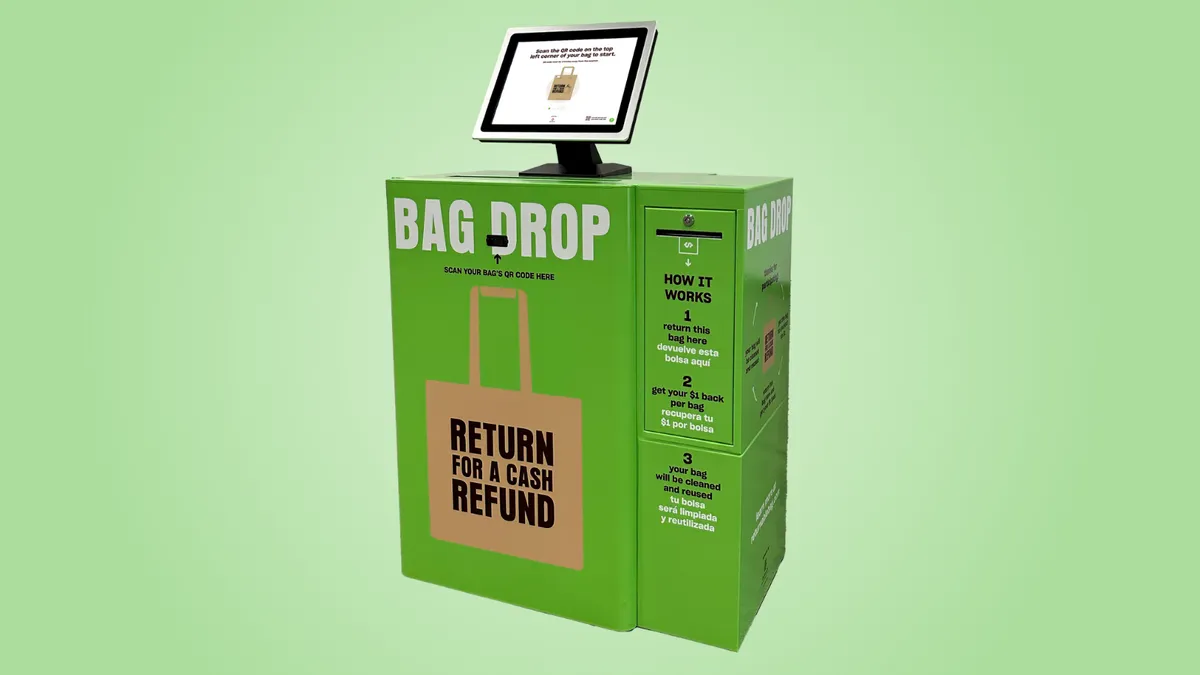Dive Brief:
- The Consortium to Reinvent the Retail Bag launched a pilot program this week to test a returnable retail bag deposit model. The overarching goal is to reduce single-use plastic bag waste by providing alternatives.
- Customers at CVS Health and Target stores in New Jersey, where a plastic bag ban took effect last year, can purchase a reusable bag for $1 at the checkout and get the deposit back when they return the bag during a return trip. The bags are washed and redistributed for reuse.
- The bags will be sold through July 17 and the kiosks will stay in place until mid-August to accept returns and provide deposits, according to Kate Daly, managing director at Closed Loop Partners. The consortium, managed by Closed Loop, will analyze insights gathered during the pilot to determine how to further refine a returnable bag system.
Dive Insight:
Bags are one of multiple packaging categories coming under fire for contributing to plastic waste. Like New Jersey, numerous states are banning single-use plastic bags at retail establishments or instituting per-bag fees to discourage their use. Reusable bags are one alternative, but barriers exist to their widespread use.
A key aim of the pilot is to measure how well a returnable bag system resonates with customers and how consistently customers will participate. Accessibility and convenience are at the heart of this model. The in-store option to borrow and return bags is designed to achieve those goals, considering “even the most green, motivated person who remembers their bags most of the time is going to have a moment where they need that kind of help — myself included,” Daly said.
A bag deposit system also could benefit consumers who don’t wish to accumulate reusable bags at home, she said, noting that some people have a “tote bag full of tote bags.”
The group is partnering with 99 Bridges for the technology and Returnity for bag collection, washing and redistribution. Consumers participate by scanning the bag’s QR code at a touchscreen kiosk, returning the bag into the drop box and immediately receiving $1 in cash for every returned bag. The partners will analyze data gathered through the QR codes to learn how real-life customers use such a deposit system, including how many bags are going out and coming back and how to remove any points of friction.
Previous pilots have shown that when incentives aren’t compelling enough, or when consumers must take extra steps to redeem rewards, they become a hangup. Pilot organizers this time wanted to eliminate that issue. Cash in hand is a “very strong, immediate incentive,” especially compared with other types of rewards provided through some reverse vending machines, Daly said.
“When you have a system that gives somebody a receipt that they then need to go to a second location to cash in, or gives them a reward they can use as a later date, we found that sometimes that creates just enough of a second step that people might not be as incentivized to return,” Daly said. “We wanted to remove any friction around that reward or reimbursement and make that the easy part.”
Similar to many other reusable retail bags, those in this program are made from polypropylene. The material is light, durable and can be washed and reused up to 125 times without showing signs of deterioration, Daly said. In future iterations of the program, the consortium would like bags to contain as much recycled content as possible.
This is part of the consortium’s largest returnable bag piloting initiative so far. The group also announced Wednesday a bring your own bag pilot with participating retailers, including Dick’s Sporting Goods, Dollar General, The Kroger Co., TJX and Ulta Beauty. Collectively, the two pilots will take place in more than 150 retail stores across the country.

















